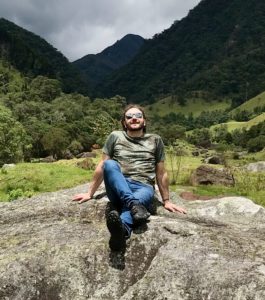Prodigy
Today’s task consists
in carrying a stone from here to over there.
It’s a heavy one,
weighs more than an ox,
more than a bag brimming over with rain.
It’s a prehistoric hole,
a black mirror
about to devour the world.
Today’s task:
lifting that stone with one’s gaze and gracefully
placing it in the middle of the road
so the cyclists stop pedaling,
so the background music ceases,
and Route Two halts,
at the time indicated by the red arteries.
And when everything’s stalled,
cars having braked suddenly because of the stone,
the illustrious and pious generations detained,
the love between natural things detained,
as well as protest marches,
the task will then
consist in picking it up from that spot,
raising the stone once again with a tired gaze,
and burying it over there, into nothingness,
that lake sealed by indifference
where bed-springs squeak, the television crackles,
the motors shine,
wine-glasses fall beneath the light,
memory and sad conversations rot,
then sink, with the stone,
into the most absolute of extinctions.
“Prodigy” (The High Window Review, 2018).
Prodigio
El trabajo de este día consiste
en llevar una piedra de aquí para allá.
Es una roca muy pesada,
más que un buey,
más que una bolsa cargada de lluvia.
Es un agujero prehistórico,
un espejo negro
a punto de tragarse el mundo.
El trabajo de este día consiste
en alzar esa piedra y depositarla
suavemente en el medio del camino
para que se detengan los ciclistas,
se detenga la música de fondo,
se detenga la Ruta Dos
a la hora señalada por las arterias rojas.
Y cuando todo esté detenido,
entorpecido por la piedra,
detenidas las generaciones ilustradas y piadosas,
detenido el amor entre las cosas naturales
y las cosas manifiestas,
el trabajo, entonces,
consistirá en sacarla de ese lugar,
levantar la piedra nuevamente, con los ojos cansados,
y enterrarla por ahí, en la nada,
en ese lago de cerrada indiferencia
donde cruje la cama, alumbra el televisor,
brillan los motores,
cae el vino adentro de la luz,
se pudren la memoria y las conversaciones tristes,
y se hunden, con la piedra,
en la más completa extinción.
Drowned Man
I wish to clarify that it didn’t happen in a river;
I drowned on land.
The only river that I keep in my memory:
a shuddering in which
small things sink
although they never entirely disappear.
Sometimes they sink before
the river reaches them.
And their clamoring for help
always
arrives late.
“Drowned man” (The Bitter Oleander, 2017).
El ahogado
Deseo aclarar que no fue en un río
sino en la misma tierra donde me ahogué.
El único río que llevo en la memoria
es un estremecimiento
donde las pequeñas cosas se hunden
aunque nunca llegan a desaparecer.
A veces,
se hunden antes de que pase el río.
Y su pedido de auxilio
siempre
llega tarde.
The Differences Between My Father And Kerouac
My father was born a year later,
far away, nearly at the highway’s edge.
However, Kerouac did not have a father
born at high seas, like my grandfather.
Why would he write poetry, my father.
But Kerouac, both Catholic and Buddhist,
exceeded the borders.
Dad had a red bicycle: that meant traveling.
Ugh! Both loathed communism.
I believe that if some mysterious accident
would have landed them both at the table of some bar
they would have laughed a lot.
Yet my father, who was a Peronist, got drunk
only once his entire life.
“The Differences between My Father and Kerouac” (Dispatches Poetry Wars, 2018).
Las diferencias entre mi padre y Kerouac
Mi padre nació un año después,
muy lejos, casi a la orilla de esta ruta.
Kerouac no tuvo, a su vez, un padre
nacido en altamar, como mi abuelo.
Y para qué iba a escribir poesía, mi padre.
En cambio Kerouac, entre católico y budista,
excedía todas las fronteras.
Papá tenía una bicicleta roja: eso es viajar.
Uf, ambos detestaron el comunismo.
Creo que si un cruce misterioso
los hubiese reunido en la mesa de algún bar
se habrían reído mucho.
Pero mi padre, que era peronista, se emborrachó
una sola vez en toda su vida.

Daniel Calabrese is an Argentinian poet and editor. Since 1991 he has been living in Santiago de Chile, where he became involved with the poetry and literary life of his adopted nation. Among his many collections of poetry, one must mention such titles as La faz errante, which won the Alfonsina Prize, and Oxidario, Prize from the National Arts Fund in Buenos Aires, as well as his book Ruta Dos, winner of the Prize Revista de Libros in Chile. In 2017, anthologies of his work were published in Mexico, Ecuador and Colombia. Parts of his work have been translated into English, Italian, and Japanese. He is also the founder and director of Ærea, an annual review of poetry and translation.
Cover image: Photo by Melina Piccolo.





















































